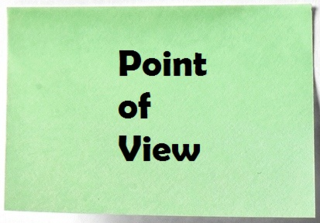Types of third-person point of views
By far,  the most common point of view used in literature is that of third-person.
the most common point of view used in literature is that of third-person.
When the narrator is not a character in a story, a third-person point of view is being used. All characters in a third-person tale are referred to using pronouns such as he, she, it or they but not I, we or you. The latter three pronouns would place the narrator within the story.
Authors like third-person narration because it offers a tremendous amount of flexibility in plotting and character development. While first-person and second-person points of view limit the writer to the perspectives of a single character, third-person opens the story wide. The story can be told from the viewpoint of several characters, all of whom can grow to varying degrees.
Third-person can be thought about by using two different scales: limited/omniscient and the subjective/objective.
The limited/omniscient scale runs between two extremes. Third-person limited occurs when the narrator tells the story only from the main character’s perspective. In contrast, third-person omniscient allows the narrator to tell the story from multiple characters’ perspectives.
The subjectivity/objectivity scale also stretches between two poles. Third-person subjective (aka third-person intrusive) incorporates the narrator’s commentary about what is occurring in the story and was popular in the 19th century among such writers as Charles Dickens. Third-person objective (aka third-person impersonal or third-person unobtrusive) leaves out the narrator’s editorializing and was championed by such 20th century writers as Ernest Hemingway.
Of course, the two scales can be combined. For example, a story could be written in third-person limited objective, in which the narrator focuses on the perspectives of a lone character and offers no commentary on the story’s action, or it might be in third-person omniscient subjective by telling the tale from the perspectives of multiple characters with commentary from the narrator about the value of their thoughts and actions.
Need an editor? Having your book, business document or academic paper proofread or edited before submitting it can prove invaluable. In an economic climate where you face heavy competition, your writing needs a second eye to give you the edge. Whether you come from a big city like Cleveland, Ohio, or a small town like Roachtown, Illinois, I can provide that second eye.
<A HREF="http://ws-na.amazon-adsystem.com/widg... Widgets</A>Related articles
 Select a viewpoint that gives you flexibility
Select a viewpoint that gives you flexibility



